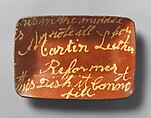Dish
Possibly Smith Pottery
Not on view
This slip-decorated red earthenware dish was probably made at the Smith Pottery in Norwalk, Connecticut. It is decorated with haphazard cursive script reading: "This in the middle is rote ill/ Martin Luther Reformer/ For this dish it cannot fill." Smith Pottery was one of the most successful in Norwalk, an area with a notable thriving pottery industry. Dishes with writing in slip-script like this one began as souvenirs made by Absalom Day (1770-1843) and were continued by his nephew Asa E. Smith (1798-1880). Slip-script decorated redware was more ornamental and commemorative than utilitarian. Two other examples of this technique can be found in the Met’s collection: a plate bearing the name "Lafayette" (34.100.223) and the other "New York City" (48.124). The religious reference on this dish, "Martin Luther Reformer," was not uncommon for Smith Pottery, indicating a market for religious wares in Norwalk and possibly a connection to Absalom Day’s work as a Methodist preacher. More unusual is the text around the central inscription which reads "This in the middle is rote ill/for this dish it cannot fill." This could be a playful note from the potter suggesting that they were unhappy with their work on the central inscription. It also demonstrates in a charming way the technical difficulties, as it appears the decorator did not leave room for the "t" in "cannot" and had to make it a superscript.
This image cannot be enlarged, viewed at full screen, or downloaded.

